Contrary to the words of the Constitution that “all men are created equal,” in the real world, some men may be more equal than others. However, laws are meant to regulate people’s behavior and create a level field so that all men are created equal under the law. Often times, men apply the law unevenly leaving others to execute, interpret and modify their misapplications. (There is a vast and distinct difference between natural laws and man-made laws—rules to govern and live by). Laws that are meant to protect society are sometimes used against those they are designed to protect. Laws have been used to enslave, discriminate, oppress and keep Blacks and others in check—legally and then residually, in the form of institutional racism. However, throughout the history of this nation men and women have stood up, and have used the law to change society’s landscape by forcing America to do, as Dr. Martin Luther King Jr. exhorted, “live up to its creed that all men are created equal.”
 Such is the distinguished group of Black lawyers—men and women—who specialize in all areas of law and are always on call to make the best deal and/or keep their clients out of trouble. They have scaled many legal mountains to reach the top of the legal profession. Some became lawyers who made their marks in courtroom settings; some gravitated to legislatures; and others have done both.
Such is the distinguished group of Black lawyers—men and women—who specialize in all areas of law and are always on call to make the best deal and/or keep their clients out of trouble. They have scaled many legal mountains to reach the top of the legal profession. Some became lawyers who made their marks in courtroom settings; some gravitated to legislatures; and others have done both.
Before Thurgood Marshall became the first Black to be appointed an associated justice to the United States Supreme Court, he was the greatest constitutional lawyer in the nation—having won over 20 cases before the U. S. Supreme Court. He led the first dream team in 1954 before the nation’s highest court along with two other Black attorneys, George C. Hayes and James Nabrit. They argued the Brown case before the court, that ended with the landmark decision legally outlawing discrimination and segregation: “Brown vs the Topeka Board of Education” which broke down barriers that were installed by over two centuries of racism and legal discrimination that were institutionalized by “Dred Scott vs Sandford” and “Plessy vs Ferguson.”
 Walking in the footsteps of Justice Marshall, he practiced law in the courtroom, he taught constitutional law at the University of Chicago School of Law, and as a legislator in the State of Illinois and the U. S. Senate, he authored laws. He is presently the leading contender of the Democratic Party for the nomination to be the President of the U. S.—Senator Barack Obama.
Walking in the footsteps of Justice Marshall, he practiced law in the courtroom, he taught constitutional law at the University of Chicago School of Law, and as a legislator in the State of Illinois and the U. S. Senate, he authored laws. He is presently the leading contender of the Democratic Party for the nomination to be the President of the U. S.—Senator Barack Obama.
LAWYERS
John M. Langston was the first African American to be admitted to the Ohio Bar Association in 1853 after being rejected by one of the local law schools. He was also admitted to the Virginia State Bar and went on to establish the Howard University Law School serving as its first dean. The John M. Langston Bar Association is named in his honor.
Charles H. Houston did not live to see the fruits of his 20-year campaign come to pass but it was his labor that culminated in the Brown decision. He was Thurgood Marshall’s mentor and his name is presently memorialized in the Charles Houston Institute that is directed by another legal scholar Professor Charles Ogletree.
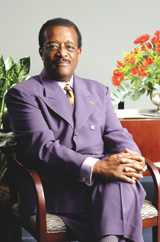 Johnnie L. Cochran Jr. will forever be remembered as the lead attorney of the “Dream Team” in the Trial of the Century. But his work as a fighter for the “oppressed” and the “underdog” started before that legal victory and exploded exponentially after that trial. He mentored legions of young legal minds that have followed in his footsteps fighting for the oppressed and the under-dog. In reference to his constant struggle against police misconduct, Cochran said, “The official version (of an event) is not always the true version.” Carl Douglas and Shawn Chapman Holley were two of Cochran’s associates who paved the way for him to “operate” in the trial of the century, and have since gone on to achieve legal victories of their own.
Johnnie L. Cochran Jr. will forever be remembered as the lead attorney of the “Dream Team” in the Trial of the Century. But his work as a fighter for the “oppressed” and the “underdog” started before that legal victory and exploded exponentially after that trial. He mentored legions of young legal minds that have followed in his footsteps fighting for the oppressed and the under-dog. In reference to his constant struggle against police misconduct, Cochran said, “The official version (of an event) is not always the true version.” Carl Douglas and Shawn Chapman Holley were two of Cochran’s associates who paved the way for him to “operate” in the trial of the century, and have since gone on to achieve legal victories of their own.
Samuel Williams was the first Black to serve as the president of the California Bar Association; he was also a police commissioner by Mayor Bradley and he also served vice president of the Los Angeles County Bar Association and was actively involved in the legal community
Melanie Lomax was a civil rights attorney and president of the Los Angeles Police Commission. After graduating from law school, she began working for the Los Angeles County counsel focusing on labor and civil law. She founded her firm specializing in age, sex and racial discrimination.
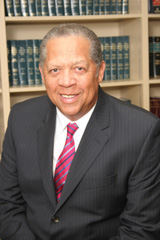 Robert H. McNeill Jr., along with Rickey Ivie and Keith Wyatt are the managing partners of Ivie, McNeill & Wyatt, one of the California’s largest and most prestigious African American law firms that specialize in an extensive array of quality legal services. With over 25 years as a legal practitioner, McNeill was selected in 2006 as one of California’s top 100 attorneys.
Robert H. McNeill Jr., along with Rickey Ivie and Keith Wyatt are the managing partners of Ivie, McNeill & Wyatt, one of the California’s largest and most prestigious African American law firms that specialize in an extensive array of quality legal services. With over 25 years as a legal practitioner, McNeill was selected in 2006 as one of California’s top 100 attorneys.
Charles E. Lloyd was the first African American trial deputy in the criminal division of the Los Angeles City Attorney’s office. He partnered with Mayor Bradley as Bradley, Burrell & Lloyd and eventually became one of Los Angeles’ most renowned criminal attorneys.
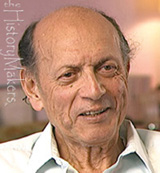 Leo Branton Jr. was not only the chief counsel in the People vs Angela Davis trial, but his clients made up A-list of Black Hollywood including Nat “King” Cole, Dorothy Dandridge and Brock Peters. Branton was well known as a litigator and was deeply involved in the civil rights movement having also defended the L.A. Chapter of the Black Panther Party against the L.A. Police Department.
Leo Branton Jr. was not only the chief counsel in the People vs Angela Davis trial, but his clients made up A-list of Black Hollywood including Nat “King” Cole, Dorothy Dandridge and Brock Peters. Branton was well known as a litigator and was deeply involved in the civil rights movement having also defended the L.A. Chapter of the Black Panther Party against the L.A. Police Department.
{mospagebreak}
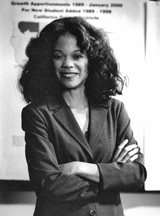
Constance “Connie” Rice was named one of California’s 10 most influential lawyers by the California Law Business about seven years ago and she is still one of the most prominent civil rights litigators in the state. She has often worked on high profiled cases tackling problems involving unfair public policy. She recently chaired the Blue Ribbon Rampart Review Panel, which delineated a number of suggestions to be taken in the constant struggle against street gangs and police misconduct.
Christopher Darden was one of the lead prosecutors in the Trial of the Century. Though he took over after the case had already started, he was very tireless in his efforts matching wits with the defense team. After the trial, Darden left the district attorney’s office and went into private practice. He has also written a book about the trial and sometimes lectures at one of the local law schools.
Maxcy Filer is a legend in the legal community—as well as a former city councilman of Compton and an activist—for his dogged persistence. He took the State Bar Examination 48 times over a three-decade period before he passed. He now shares the legal spotlight with some of his children who are also members of the Bar.
Willie Gary is known in legal circles as the giant killer who has represented clients against major corporations. He is the senior partner in his law firm and the chairman of the Major Broadcasting Cable Network. He has won over 150 cases valued in excess of $1 million each and as much as $240 million from Disney and $139 million from Anheuser-Busch.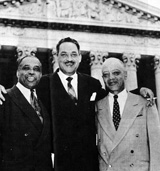
JUDGES and LAW PROFESSORS are an integral part of the legal community even though their roles are not as publicly profiles as the aforementioned attorneys.
Jane Brolin was the first Black woman to graduate from Yale Law School and the first in the United States to be appointed a lower court judge in 1939.
Earl C. Broady Sr. was the first African American police officer from the LAPD to be appointed a Superior Court Judge. His son, Earl C. Broady Jr., has followed his footsteps and is presently a practicing attorney.
Bernard Jefferson was one of the first African Americans to be appointed to the state appellate court and author of the California Evidence Benchbook.
Edwin Jefferson, brother of Bernard Jefferson and the first Black to sit on the Municipal Court in the Western United States.
Wiley Manuel was the first Black to be appointed the California Supreme Court.
A. Leon Higginbottam was a federal judge and a U.S. Court of Appeals judge wrote a public letter denouncing some of the decisions by Justice Clarence Thomas.
Vaino Spencer is the presiding justice of Division One of the California Second Appellate Court and well in her 80s, she shows no sign of retiring for she sees her role as a protector and defender of the rights of the downtrodden, the forgotten and the voiceless.
Candace Cooper is the presiding justice of Division Eight of the California Second Appellate Court and has also served as a judge in the Los Angeles Municipal and Superior Courts.
Damon J. Keith is the longest serving African American on the federal bench and remembered for the “Keith Decision” where he ruled against the President that led to the creation of the “FISA” court.
Charles Ogletree a Harvard Law School professor who is actively involved in a wide range of issues involving injustices in the Black community throughout the country. He was legal counsel to another professor, Anita Hill during her congressional appearance.
Constance Motley was the first Black woman to be appointed as a federal judge.
William H, Hastie was the nation’s first Black federal magistrate, he was appointed in 1937 to the District Court in the U.S. Virgin Islands.
LANDMARK DECISIONS that affected the quality of life experienced by Black Americans played a major role in advancement of society as a whole.
Dred Scott vs Sandford—Blacks had no rights.
Plessy vs Ferguson—Introduced separate-but-equal as the law
Brown vs Board of Education—Overturned separate-but-equal
Shelley vs Kraemer—Denied racially restrictive covenants in housing
Loving vs Virginia—Ruled interracial marriage was unconstitutional
Regents of the University of California vs Bakke—Affirmative Action was unfair.
Though Thomas Bradley is forever remembered as the first Black mayor of Los Angeles—who served five consecutive terms—and changed the landscape of the city, he was a practicing attorney who enhanced his legal skills as a legislator (city councilman) and then as mayor.
After graduating from law school, Julian Dixon served six years in the California State Assembly becoming chairman of the Assembly Democratic Caucus. He then represented California’s 32nd District for over ten terms in the U. S. Congress.
Supervisor Yvonne Burke scored a lifetime of firsts beginning with being one of the first Black women to graduate from the USC School of Law, the first Black woman in the California State Assembly, the first Black woman from California elected to the U.S. Congress and the first Black woman to be appointed and then elected to the Los Angeles County Board of Supervisors.
Willie L. Brown Jr. graduated from Hastings College of Law and while practicing law, he went on to serve 31 years in the California State Assembly, 15 as the longest serving Speaker. He then became the first African American mayor of San Francisco.
Some of the other African American mayors, legislators and executives who are/were also lawyers:
MAYORS
Maynard Jackson—Atlanta, Georgia
Harold Washington—Chicago, Illinois
Davis Dinkins—New York, N.Y.
Kenneth Gibson—Newark, New Jersey
Richard Hatcher—Gary, Indiana
Roosevelt Dorn—Inglewood, California
Eric Perrodin—Compton, California
LEGISLATORS & EXECUTIVES
Randall Robinson—founder of Transafrica
Carol Moseley Braun—former U. S. Senator
Edward W. Brooke—former U. S. Senator
Black lawyers all over the world have engaged the legal systems of their respective countries to attain some of the basic rights guaranteed to all human beings, but were being denied to a segment of the people, and to gain freedom from tyranny, as did Mohandas K. Gandhi, the Mahatma in India, and Nelson R. Mandela in South Africa.






